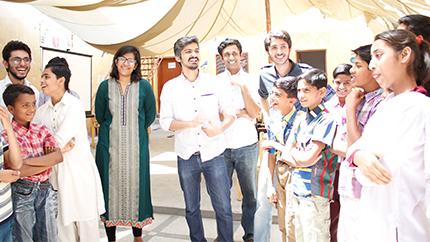July 2, 2015
UGrad Alumnus Creating a Tolerant Society through Global Engagement
430x242_ugrad_lahore.jpg
 Organizers and participants enjoying a light moment during a role-playing activity at an ‘Aghaaz-e-Ravvish’ workshop at Mashal Model School
Photo Credit,
Pakistan-U.S. Alumni Network
Organizers and participants enjoying a light moment during a role-playing activity at an ‘Aghaaz-e-Ravvish’ workshop at Mashal Model School
Photo Credit,
Pakistan-U.S. Alumni Network
On a hot Saturday in May over 20 students made their way to a special class on the porch of the Mashal Model School in Lahore. The class began with an educational cartoon. The students paid close attention as a cartoon explained the importance of nouns, verbs, and adjectives. After the show, a young instructor introduced himself and proceeded to ask students about the program and its contents.
The instructor was part of a team of students from the Lahore University of Management Sciences (LUMS) that hosted a series of workshops dubbed ‘Aghaaz-e-Ravvish’ at the private Mashal Model School. Global UGrad Alumnus Syed Zia Hussain Shah is the brains behind the project which aimed to be the first low-cost tech-based distance learning program in Pakistan.
“After the Peshawar school attack, the whole country was in a state of shock and this is exactly what needed to be done,” said Shah. “Therefore, I decided to initiate this project in different schools to highlight the importance of tolerance, empathy and conflict resolution.”
Aghaaz-e-Ravvish took place with the help of a $5,000 USD grant from the Pakistan-U.S Alumni Network. All alumni of various U.S government sponsored exchange programs in Pakistan can apply for the grant to enable them to give back to their communities.
“I applied for the Alumni Small Grant because of the access and ease associated with getting a grant as an alumnus,” said Shah.
Opening Up a New World to Pupils
Aghaaz-e-Ravvish consisted of seven sessions, three to four hours each, and were held in four different private schools with about 110 pupils from Grades 7 to 9. The sessions covered different topics like Grammar, Reading, Writing and Global Engagement through Skype sessions with people from different countries including the United States, United Kingdom, India, China, Germany, and Afghanistan. These sessions taught the participants about empathy, how differences can lead to conflict, and how it is important to co-exist peacefully.
“I really liked the workshops because we found out what people do in other cultures . . . their lifestyles and about what they ate and drank,” said Sana Aslam, a grade 9 student.
“Before I attended the workshops, I used to say that being a Muslim I should not eat food from a Christian plate, but now I don’t judge people from the prism of their religion,” said Esha Ashiq, a grade 9 student.
“I really liked the Skype sessions as I found out about people from different cultures,” said Adnan Ali, a grade 10 student. “For example, one participant from India said she liked waking up to the sound of the Namaz in the morning.”
The participants were also full of praise for the workshops aimed at improving their English comprehension.
“I had knowledge about grammar in the past but now I am able to apply its principles much better,” said Rida Bashir, a 10th grade student. “I have been able to improve my English, while before I could not even understand it!”
Advancing towards a Better Future
The last module of the workshops involved a computer literacy session where the pupils learned how to use email, how to use Google to search for information, and how to work on Microsoft Word. The students also received certificates in the graduation ceremony, so that they could feel a sense of pride at having attended the sessions.
The students appreciated the Ravvish workshops, and many felt they should be a recurring feature instead of taking place only once.
“Such events should take place after every two months as they break down important information for us in a simple language,” said Haroon Mushtaq, a student.
As for his next step, Shah is working on a project with the U.S Consulate Lahore and is also further developing his curriculum in order to pitch his concept to private schools. He attributes all his success to his exchange experience in the U.S.
“My UGrad exchange experience gave me the push to work on my project and encouraged me to conduct basic groundwork,” he said.
For now, the alumnus is relieved and happy that all his efforts have borne fruit.
“I would sometimes feel that my project is falling apart, but the result turned out to be far better than I had expected,” Shah said. “This initiative has also given me hope to do more in life.”
Connect with Aghaaz-e-Ravvish on Facebook.
